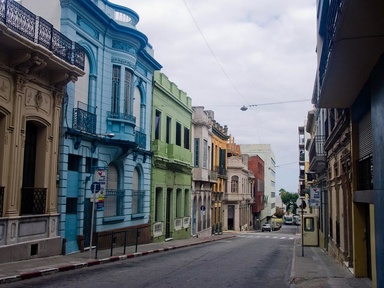
The Consortium of Humanities Centers and Institutes (CHCI)—a global forum that strengthens the work of humanities centers through advocacy, grant-making, and inclusive collaboration—has selected a joint humanities project of the Obermann Center for Advanced Studies and the Universidad de la República, Uruguay, to participate in its Global Justice and Humanities Practices initiative, with an accompanying award of $10,000.
“Mass Migrations, Personal Voices: Latin American Women Migrants Write Their Stories” will explore and disseminate new insights into the impact of guided creative writing on the lives of Latin American migrant women. Luis Martín-Estudillo, Director of the Obermann Center, authored the proposal and will serve as the project’s PI. Luis Muñoz, UI Associate Professor of Spanish and director of the MFA in Spanish Creative Writing, and a graduate student in Spanish Creative Writing will work alongside Martín-Estudillo and two faculty from the Centro de Estudios Interdisciplinarios Migratorios (Center for Interdisciplinary Migration Studies) at the Universidad de la República in Montevideo, Uruguay’s flagship institution, to plan and conduct creative writing workshops for women who recently migrated to Uruguay, having fled economic and humanitarian crises in their native Venezuela.
“Though there’s been a constant flow of Venezuelans into Uruguay for the past 10 years,” writes Martín-Estudillo, “the presence of women over 40 is particularly notable. Our project seeks to understand why Venezuelan women choose to go to Uruguay, what types of oppression they’re fleeing, what life is like for them in Uruguay, how they relate to other Venezuelans and Uruguayans, and what they envision for their own and their children’s future.”
Preliminary research suggests that creative writing can be a powerful tool for migrant women to process the often-traumatic changes associated with relocating to a new country. “Mass Migrations” seeks to understand why. What can creative writing and the humanities do for these women and for others in comparable situations? How should this approach differ from other initiatives that help migrants cope with change? What are the best practices for archiving and sharing the documents generated by this type of community-oriented creative writing program?

In 2025, Dr. María de los Ángeles González and Dr. Fernando Ordóñez, faculty members from the Universidad de la República, will attend creative writing workshops at the University of Iowa and discuss pedagogical methodologies with UI students and faculty in sessions hosted at the Obermann Center. They will then return to Montevideo, Uruguay, to conduct writing workshops, where they will guide thirty-some migrant women in documenting their personal trajectories and the challenges they faced during their migration process. Spanish-speaking researchers from the University of Iowa will also travel to Montevideo to participate in the writing workshops and gain first-hand knowledge of the context and people involved in the program. After the workshops, the team plans to create an anthology of the participants’ narratives, with the goal of making their stories visible in the community and contributing to the wider discussion of migration and gender. The project will be presented at CHCI’s annual conference in Berlin in June 2025, for which CHCI is providing additional funding.

“‘Mass Migrations’ aims to further public advocacy for migrant women, create a support network of migrant women, and empower the workshop participants themselves,” says Martín-Estudillo. He’s hopeful that the project will also contribute to academic knowledge on the social impact of creative writing workshops for the general public and even provide working models that could benefit researchers and practitioners worldwide.
This project aligns with the Obermann Center’s recent efforts to internationalize its programming—a priority for Martín-Estudillo, who assumed directorship of the Obermann Center in Fall 2024. Originally from Spain, Martín-Estudillo has studied and taught criticism, cultural history, and literature across Europe and the United States. “I always had a very international experience,” he recalls; “being exposed to colleagues, professors, and classmates from around the world—that is an essential part of what a university is about.” Obermann International Fellowships, which bring international researchers and artists to the UI each semester, is another of his noteworthy new initiatives. “The Writing University is the perfect intellectual home for the ‘Mass Migrations’ project,” he notes, “as people are already writing and analyzing writing across multiple languages here” (see, for instance, the Spanish Creative Writing Program and the International Writing Program).
Guillaume Ratel, Executive Director of CHCI, praised the proposal for “blend[ing] literary humanities with lived experience, creating a model for humanities-driven engagement in migrant justice.” CHCI’s Global Justice and Humanities Practices Initiative supports research projects and programs that apply humanistic methods to critical global issues such as migration, environmental justice, and the legacies of colonialism, as well as engage with the lived experiences of communities facing historical and ongoing injustices. Other projects chosen to participate in the initiative include “Just and Inclusive Climate Havens and the Humanities,” Humanities Center, University of Rochester; “Environmental (In)justice: Project Jadar and Lithium Frenzy,” Institute for Philosophy and Social Theory, University of Belgrade; “Justice-in-Education Initiative,” Society of Fellows and Heyman Center for the Humanities, Columbia University; “Water Commons: The Living Legacy of the Colorado River,” Humanities Institute, Arizona State University, and “Displaced Scholars in Residence,” Institute for the Humanities, University of Michigan.
The Obermann Center for Advanced Studies has been a member of CHCI since 1989.